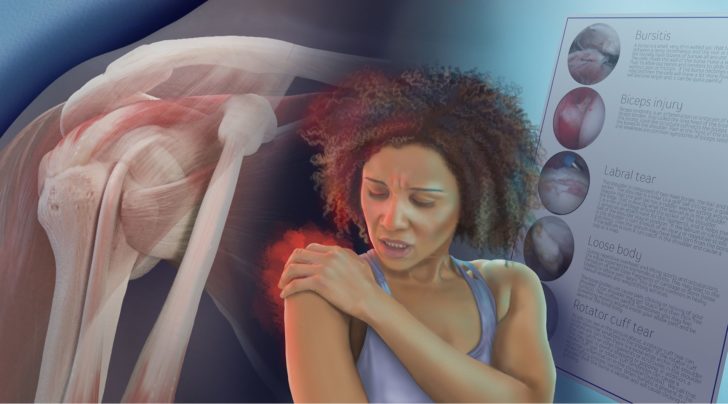
Snapping Shoulder
Shoulder snapping or popping is a very common complaint. A grinding sensation in the shoulder is even more common. The shoulder is a very complex joint so there are many structures that can snap, pop or click when they are injured or inflamed. The shoulder contains muscles, bones, tendons, cartilage, and a bursa. Those tissues interact and move upon one another like a complex ballet. Often times the clicking or popping you feel is simply normal because all of these structures are moving on one another. Rest assured, the majority of sounds or sensations coming from your shoulder are often not a cause for concern.
Can this be normal?
Sometimes the popping or grinding in the shoulder is because something is inflamed or damaged. When our tendons become inflamed they swell. That swelling can tighten the spaces available for all those complex structures in the shoulder which might cause popping or grinding with certain motions.
The most common causes of painful shoulder popping include rotator cuff tears, bursitis, labral tears, biceps tendon problems, and arthritis. I see between 5-10 patients a week who are simply in my office because they want to know – Why does my shoulder snap, click and pop?
Most of you are worried about the sounds your joints are making. It’s a natural concern. You’re not sure if it’s normal or not. Some of you have pain and want to know what’s causing the pain and the new sensation.
Read on… I’m going to try to help you sort through whether or not your popping or grinding shoulder is mostly “normal” or is it due to something that should be looked at further. In another post, I describe the things to look for to know if you had a serious shoulder injury.
Shoulder Anatomy
The shoulder is a very complex joint composed of bone, cartilage, ligaments, tendons, and two different tissues that line the inside of our shoulder joint. We call those tissues that line the inside of the spaces the Synovium and the Bursa. If any of these structures are injured or simply inflamed (and thus thicker), the smoothly functioning shoulder can pop, snap or click. These “injuries” can be due to everyday use, a sports injury, chronic repetitive stress due to sports, or significant trauma from a fall or accident. Most of this inflammation will subside on its own.
Should I be worried about my shoulder popping?
Most of the time the clicking or snapping in the shoulder is due to everyday use and changes that occur over time within our joints. As we age this causes some of the surfaces to roughen —thus when they rub against one another they will snap, click, or pop within the shoulder. For most of you, painless snapping or clicking of the shoulder is not an issue to worry about. For many of you, the popping or clicking may eventually subside over time, or you may simply get used to it.
Painless clicking and popping usually do not require any treatment at all.
Painful shoulder popping
If your shoulder hurts when it pops, or if the popping and snapping started after an injury then you should consider an examination by an Orthopedic Surgeon.
Below is a discussion of the most common causes of painful shoulder snapping and popping.
Clicking or popping of shoulder may start soon after an injury. That might mean that you have sustained a serious shoulder injury. Here are some situations when the noise coming from your shoulder could signify a problem.
- If your shoulder was injured and it is now sliding in and out of place (dislocating), it may snap or pop.
- if the biceps tendon is moving around too much or dislocating from its groove.
- If the rotator cuff was injured or torn.
- If the labrum of the shoulder was torn.
- A piece of cartilage has torn loose and you have a “loose body” getting caught in the shoulder.
- If the snapping is in the back of the shoulder, it could be an issue (often bursitis)with your shoulder blade or scapula.
- if you have calcific tendonitis, the inflammation could make the shoulder click or grind.
Here is my latest video…
Causes of painful clicking or popping in the shoulder:
Labral Tears or SLAP lesions :
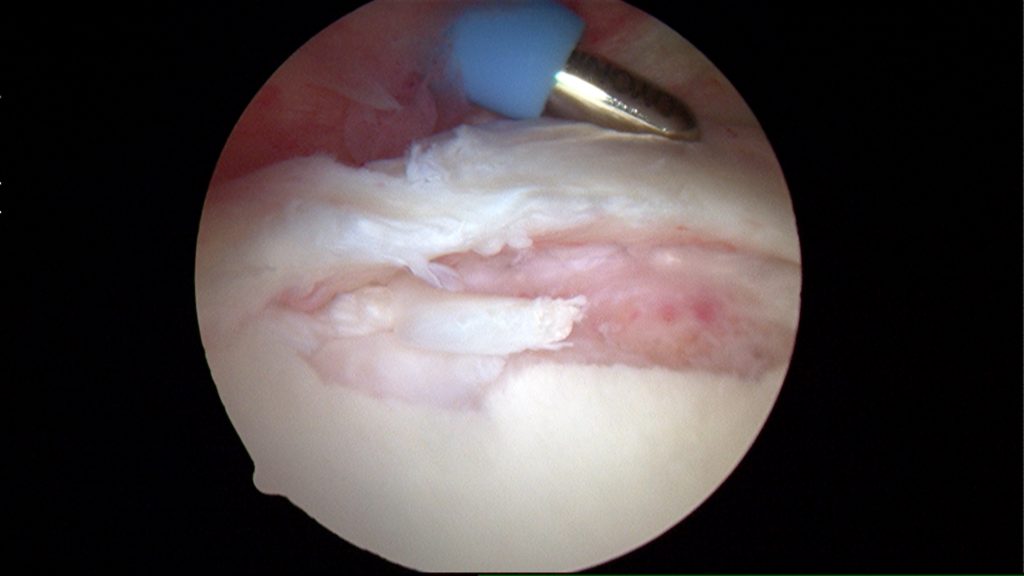
The shoulder is composed of two main bones, the ball and the socket. The shoulder is similar to a golf ball sitting on a golf tee. Imagine that the golf tee has a rubber washer sitting around the edge. That is exactly what the labrum is in the shoulder. It is a rim of cartilage around the socket of the shoulder. It serves as an attachment for the ligaments, and it helps the ball of the shoulder stay in position. If the labrum or cartilage in the shoulder is torn a result of an injury or repetitive stress (pitching), then the labrum may have been torn from the bone If the labrum is torn it can catch in the shoulder and cause a pop or a snap. People with painful popping or their shoulder dislocates due to a labral tear may respond to physical therapy. If after therapy your shoulder continues to dislocate, or has a painful catching or popping you may consider an arthroscopic surgery on the shoulder to repair the labrum (see picture below). A SLAP lesion is simply a tear of the top of the labrum in the shoulder. Labral tears cause different symptoms based on where the labral tear is. For example. SLAP lesions typically do not allow the shoulder to dislocate, but it can cause popping or catching. Tears in the front or back of the labrum can cause dislocations of the shoulder.
- Labral Tears – is Surgery Necessary
- Do Labral Tears Require Surgery?
- See this discussion to learn more about SLAP lesions.
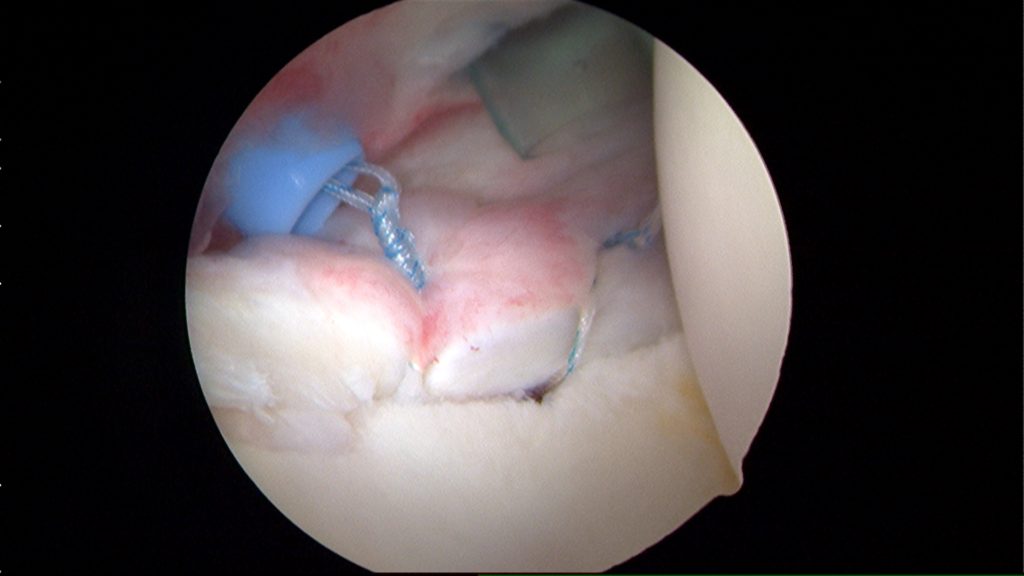
Biceps Tendon and Snapping in the front of the shoulder.
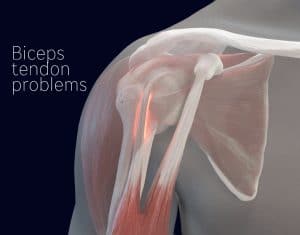
Rotator Cuff Tears
As you can see in the picture about, a rotator cuff tear can cause abnormal sensations in the shoulder. If the rotator cuff tendons are torn then there is a loose edge within the shoulder that can catch on other ligaments or structures in the shoulder. This may lead to painful snapping or popping. In addition, a rotator cuff tear, or rotator cuff tendinosis can cause a secondary inflammation in the 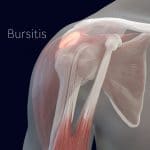
- Click here to help determine if you have a rotator cuff tear?
- Click here to learn more about the treatment of rotator cuff tears.
Shoulder Dislocations
Shoulder dislocations are a common cause of popping in the shoulder. Especially posterior instability where the ball is moving backward on the socket.
If the ligaments in the shoulder were injured from an acute injury, the shoulder becomes loose and start dislocating. This can lead the ball of the shoulder to slide up or over the edge of the socket. When the ball then falls back into place it may cause snapping or popping. This section on shoulder dislocations delves further into detail on shoulder instability. For more information. Click here to learn more about shoulder dislocation surgery.
Loose Bodies
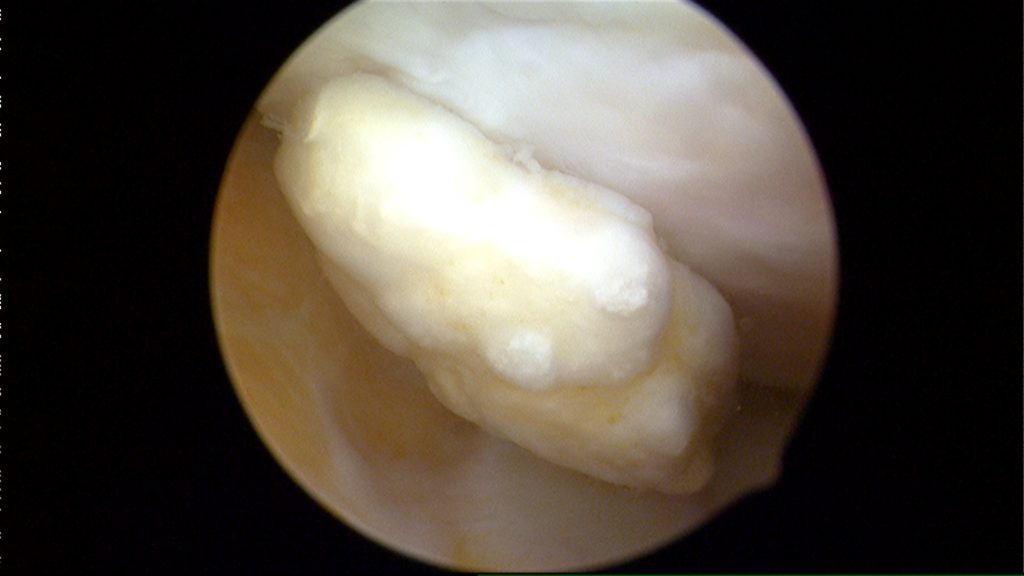
Shoulder Arthritis
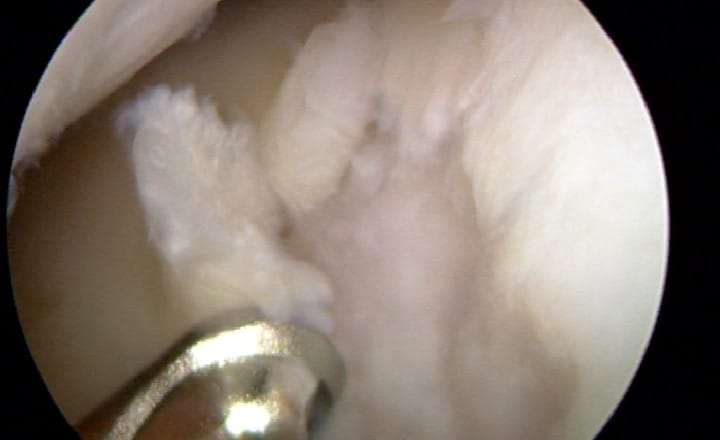
Rest assured that the majority of shoulder snapping or clicking is *normal*. If you have pain, or if you are concerned –or certainly if you’re snapping or popping started after an injury –you should be evaluated by an Orthopedic Surgeon trained in Sports Medicine to examine you and determine why your shoulder is popping or clicking. An MRI might be necessary to see if the shoulder labrum is torn, if you have loose bodies floating around, if the biceps tendon is unstable or if osteoarthritis of the shoulder is present.
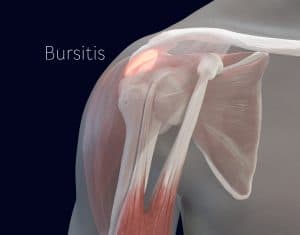
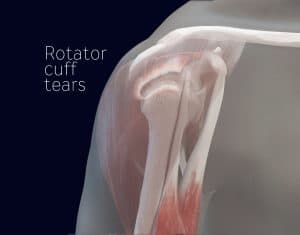
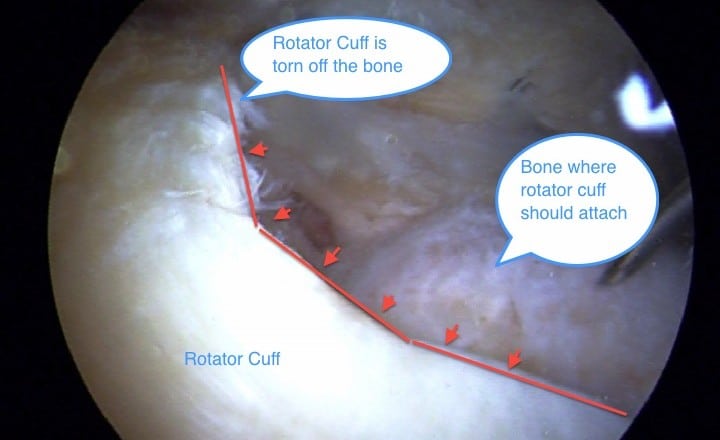
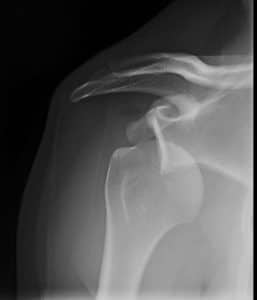


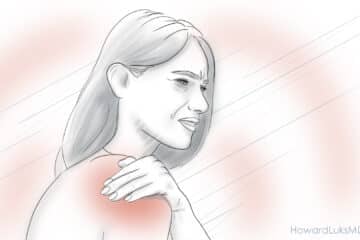


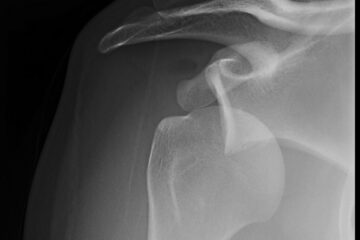







I’m currently 15 and both of my shoulders constantly pop and I never have once had a shoulder injury. Even when I raise my arm up some it stops to a certain point then pops loudly. Most of the time they do cause pain. They didn’t start popping till about mid- August last year. I talked to the physical trainer here at my school and she said they may just be growth spurts, but the stretches she gave me aren’t working. I don’t know if its just stress on my shoulders from playing many sports or what. I have tried to get my dad to get an appointment scheduled to get it looked at and we haven’t yet. So i’m hoping you might have an idea on what it could be. Thanks.
HI !
I young children painful popping can be a sign of “instability” where the shoulders are a little “loose”. Many shoulder pop without pain and can be safely ignored. When you have painful popping it should be looked at by a shoulder doctor or sports medicine doc.
Hello I had a sports injury from pitching many years ago, over a decade! I have pain and limited mobility to raise my arm above my head is painful. I have various popping and grinding sensations and after throwing around a softball my arm sometimes appears to feel numb. I also feel pain in my arm pit area along with where my bicep meets my shoulder. What kind of doctor should I seek for this? I have lived with this pain for quite sometime. Only here recently it has got worse and I am having difficulty sleeping and evening shooting a basketball. Appreciate your feedback.
Hi Gary … You should see a Sports Medicine doc who specializes in shoulders. Some sports docs concentrate on knees and some on shoulders. DOn’t be afraid to ask :-)
Dear Dr Luks:
Four days ago I was in the gym doing curls on the curls machine. Unlike other times, I did not do any light warm up reps, just started out with heavy weight. On about the 4th rep I heard and felt a pop, not very loud. I extended and pulled and heard and felt a loud pop with some momentary pain. I stopped immediately, got my clothes, and went home to ice my shoulder. My pain, strangely, was in the middle of my humerus, facing forward. The next morning I still had slight but sharp pain at that spot on my humerus, and slight pain at times In the center of my shoulder joint. Today, 4 days after the injury, I have full motion with no pain but I can’t yet put significant weight on that arm due to ongoing sensitivity at the humerus.
What happened? Does it require a repair?
Thank you.
HI David… you should definitely see a Sports Doc for evaluation. There are many possibilities here, and without examining you I cannot be sure which structure you injured.
Hello,
I’ve had progressive pain and weakness in my upper body (mostly in my shoulders and arms, though) that has lasted now for 7 years. I finally had an ultrasound done on my shoulders and biceps and it revealed nothing. 3 years ago, I had to stop doing yoga because my arms simply won’t hold my weight anymore. If I try to hold any position with any extremity for more than a few seconds, that body part starts quivering and I feel instant exhaustion. I think it’s cipro tendinitis, but the ultrasound was useless. Is it worth pursuing bilateral arm/shoulder MRI’s? I already had a negative EMG and a negative skin punch biopsy. Thank you in advance for any insight you may have.
Hi,
I’m not sure if you’re still active on here however I am 20 years old and the top/back of my shoulder joint clicks when I roll my shoulder. It’s gotten gradually worse over the past 2 years, it’s very uncomfortable and I often get achey pain in my shoulder and up my neck. I’m doing Fashion at University – the sewing and drawing is impossible after a couple of hours due to the pain. I’ve been to the doctors 3 times now and have been told it’s just normal.
I’m at a loss of what to do.
Sounds like it could be an issue under your shoulder blade or scapula. It’s actually a common area for bursitis to occur. It is frequently associated with clicking near the top/inner border of the shoulder blade. Consider speaking with a shoulder physical therapist, or shoulder specialist who should be able to tell you what the diagnosis is and what the potential treatment options are.
Good Luck